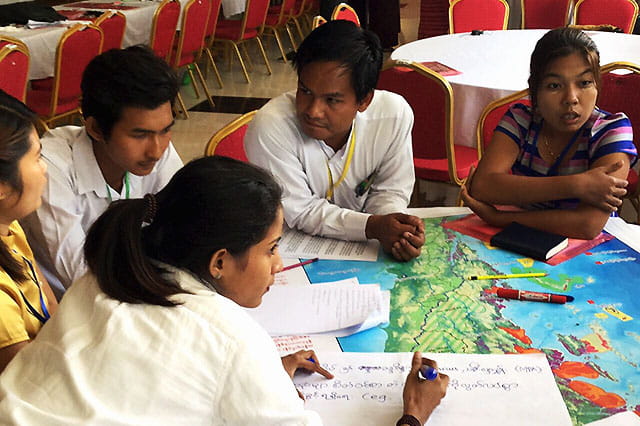MCRB and Fauna and Flora International co-host a week of Tanintharyi Tourism workshops

MCRB and FFI held a week of multistakeholder workshops on sustainable tourism in Tanintharyi with a two day discussion focussed on Myeik District at the J&J Hotel on 15/16 May attended by around 60 local people involved in the tourism industry, and international and Myanmar tourism experts, followed by two days of discussion at Victoria Cliff Hotel in Kawthaung attended by around 90 stakeholders.
U Myint Maung, Tanintharyi Minister for Natural Resources and Environmental Conservation, whose portfolio includes tourism, opened the workshop in Myeik and stayed throughout the two day discussion in Kawthaung. He emphasised the need for balanced development between Tanintharyi’s three districts, Dawei, Myeik and Kawthaung, and that tourism could only be successful if it was done sustainably as well as profitably. He identified the region’s advantages in terms of peace and stability, interesting new destinations, and a rising level of visitors, but highlighted environmental conservation and the need for proper facilities for emergencies, including healthcare as issues which needed to be addressed urgently.
Presentations from the two workshops are available here. These included presentations from the Ministry of Hotels and Tourism, and the Environmental Conservation department. There were presentations on the market for coastal tourism in Tanintharyi, international competitors for the area, and lessons learned from how they had managed their development.
In polling workshop participants in both Myeik and Kawthaung, the two main barriers to sustainable tourism were identified as unnecessary government red tape concerning permits, and lack of governance and regulation of environmental and social impacts.
An example of community based tourism (CBT) in Indawgyi, Kachin State was presented, and communities from the islands of the Myeik archipelago presented on how they saw CBT supporting their development, including a presentation on Moken culture. Organisations such as SwissContact and Partnership for Change presented on their human resources development programmes which could support needs in Tanintharyi. There was a discussion on governance and destination management, including a presentation from the IFC.
FFI presented the work which had been undertaken over four years to identify environmentally sensitive areas on which to develop a zonation map of the area, to allow for decisions to be taken by government on permitting and regulating investment and other activities. The English and Burmese versions of draft maps were presented, together with an explanation of their purpose(in English, and Burmese). Inputs were sought from participants on missing information, and also what regulations and restrictions should be applied in the different zones. Other maps available include details of currently permitted and proposed hotels, and existing and potential tourist attractions.
These workshops follow on from the December 2016 discussion in Dawei, and the work which FFI and MCRB have been undertaking to support the Myanmar Government and the business-led Tanintharyi Tourism Development Committee.
Read also
- Tourism Sector
- New Report and Upcoming Webinar on Human Rights in Tourism
- White Paper on Tourism in Myanmar
- Planning for a Brighter Future in Mrauk U: Cultural Heritage and Tourism Management
- 4th National Conference on Communities and Tourism 2019
 English
English မြန်မာ
မြန်မာ မြန်မာ (unicode)
မြန်မာ (unicode)








